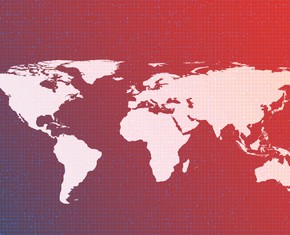The views expressed in our content reflect individual perspectives and do not represent the authoritative views of the Baha'i Faith.
Have you ever heard of the wealthy young Austrian heiress Marlene Engelhorn? What a wonderful person — she inherited $27 million from her grandmother and is giving 90 percent of it to charity.
Engelhorn is a member of Millionaires for Humanity, an international organization whose members are all multimillionaires and billionaires and who advocate for a worldwide tax on wealthy individuals. She is also the founder of Tax Me Now, a German initiative that lobbies for higher taxes on the wealthy in Germany, Austria, and Switzerland.
RELATED: A Global Minimum Tax on Corporations — A Spiritual Perspective
Because her country, Austria, abolished its inheritance and estate taxes in 2008, she felt it was fundamentally unfair for her to inherit a fortune she had not worked for — so she decided to find a way to redistribute her inheritance with the help and the recommendations of regular Austrians. To distribute that inheritance, the findings of a panel of 50 Austrian citizens were just released, naming 77 charitable organizations where Ms. Englehorn’s inheritance will be donated. (She had no input into the selection process.)
Ms. Engelhorn and others like her deserve our respect and admiration because they exemplify the Baha’i teachings that call for the voluntary elimination of the extremes of wealth and poverty, as expressed here by Abdu’l-Baha in an address he gave in New York City in 1912:
… you must assist the poor as much as possible, even by sacrifice of yourself. No deed of man is greater before God than helping the poor. … Each one of you must have great consideration for the poor and render them assistance. Organize in an effort to help them and prevent increase of poverty. The greatest means for prevention is that whereby the laws of the community will be so framed and enacted that it will not be possible for a few to be millionaires and many destitute. One of Baha’u’llah’s teachings is the adjustment of means of livelihood in human society. Under this adjustment there can be no extremes in human conditions as regards wealth and sustenance.
In fact, the Baha’i teachings directly ask the wealthy to voluntarily do exactly what Ms. Englehorn and others have done. Abdu’l-Baha, in this speech he gave in Paris in 1911, said that:
A financier with colossal wealth should not exist whilst near him is a poor man in dire necessity. When we see poverty allowed to reach a condition of starvation it is a sure sign that somewhere we shall find tyranny. Men must bestir themselves in this matter, and no longer delay in altering conditions which bring the misery of grinding poverty to a very large number of the people. The rich must give of their abundance, they must soften their hearts and cultivate a compassionate intelligence, taking thought for those sad ones who are suffering from lack of the very necessities of life.
There must be special laws made, dealing with these extremes of riches and of want. The members of the Government should consider the laws of God when they are framing plans for the ruling of the people. The general rights of mankind must be guarded and preserved.
The government of the countries should conform to the Divine Law which gives equal justice to all. This is the only way in which the deplorable superfluity of great wealth and miserable, demoralizing, degrading poverty can be abolished.
In his writings, Abdu’l-Baha recommended that all governments adopt an enlightened progressive taxation policy, where those with sufficient means contribute a significant portion of their assets to a general fund meant to reduce the great disparity between wealth and poverty. Abdu’l-Baha also clearly said that:
Man reacheth perfection through good deeds, voluntarily performed, not through good deeds the doing of which was forced upon him. And sharing is a personally chosen righteous act: that is, the rich should extend assistance to the poor, they should expend their substance for the poor, but of their own free will, and not because the poor have gained this end by force. For the harvest of force is turmoil and the ruin of the social order. On the other hand voluntary sharing, the freely chosen expending of one’s substance, leadeth to society’s comfort and peace. It lighteth up the world; it bestoweth honor upon humankind.
Millionaires for Humanity has asked the world’s nations to impose a minimum global tax of one per cent (1%) on the fortunes of all multimillionaires, saying that the wealth gap between rich and poor has never been greater — because the richest one per cent (1%!) of the world’s population now owns more than half of humanity’s household wealth.
RELATED: Why We All Need Wealth
An equitably-applied wealth tax could raise trillions of dollars globally and alleviate the entire world’s severe poverty. Of course, such a tax would only work via fair application across all nations to be effective, rather than creating a spate of tax avoidance by multimillionaires changing countries of residence.
These enlightened, progressive taxation policies, then, will require the implementation of a system of global governance and the adoption of a universal language and a single script — all central principles of the Baha’i Faith. As Baha’u’llah, its prophet and founder revealed, “It is not for him to pride himself who loveth his own country, but rather for him who loveth the whole world. The earth is but one country, and mankind its citizens.”
















Comments
Sign in or create an account
Continue with Googleor